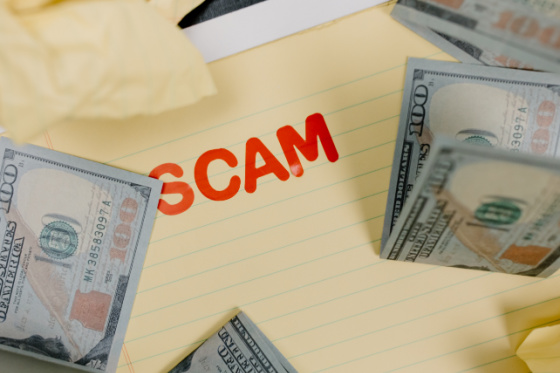Employee Retention Credit Scammers & Understanding the Risk Involved

Have you heard the commercials on the radio, online or TV regarding the Employee Retention Credit (ERC) stating that your business could qualify for a $26,000 tax refund per employee? You and your business may even have been personally solicited. These third-party promoters even tout the ease of claiming the credit stating “it only takes minutes for you to qualify” without ever looking at the company books. They make it more enticing by stating “it won’t cost you a thing” unless you receive the credit.
These are huge red flags that should make everyone think twice about those offers.
What is the Employee Retention Credit, and how does a business qualify for it?
The ERC is a refundable tax credit introduced in March 2020 as part of the federal CARES Act. Eligible businesses are those that continued paying employee wages while shut down due to COVID-19, or had a significant decline in gross receipts from March 13, 2020, to December 31, 2021. For most businesses, the credit applies to wages paid between March 13, 2020, and September 30, 2021. Generally, only Recovery Startup Businesses can claim the ERC for wages paid after September 30, 2021.
The ERC has been amended three times by the Taxpayer Certainty and Disaster Relief Act of 2020 (Relief Act), the American Rescue Plan Act of 2021 (ARPA), and the Infrastructure Investment and Jobs Act of 2021 (IIJA). Each amendment made some form of change to the preceding act. The number of changes are too many to name in this article, but the IRS has published a quick reference comparison chart for 2020 vs. 2021; it can be found on the IRS website: Employee Retention Credit – 2020 vs. 2021 Comparison Chart. We note that the IRS website – irs.gov – offers several related articles on the credit itself and on scams / frauds and how to protect your business from them.
Besides navigating the several qualifications for the ERC, other factors also need to be considered. Did you pay any “COVID wages” (qualified sick leave or qualified family leave wages)? Did you receive a Paycheck Protection Program (PPP) loan? If so, the wages used to qualify for the PPP loan forgiveness and/or the wages used for the COVID-19 wage credit cannot be used when calculating qualified ERC wages. These calculations can be very technical, and having your tax professional prepare them is highly recommended.
Additionally, wages relating to a shareholder who has a 50% or greater share in the business do not qualify for the ERC, including the wages of their relatives. Applying IRC Section 267(c)(4) attribution rules to a small business can sometimes disqualify a large portion of wages for the ERC. For example, three brothers each own a third of the business. On face value, they may think they only own 33% each and can use their wages toward the ERC because they each own less than 50%. Unfortunately for them, this is not correct – in fact they each constructively own each other’s share of the business for a total of 100% each. Therefore, none of their wages would qualify for the ERC.
If the ERC is claimed after you have filed a 2020 or 2021 business tax return, you will need to amend the business’s return and possibly also personal tax return(s). Although the refund is not deemed as income, you are required to reduce your payroll expenses for the credit.
What to know about the scammers
The ERC has proven to be a temptation for third-party promoters to scam money from innocent taxpayers by either charging large upfront fees, or a fee based on the amount of the ERC received. They often take improper positions and calculations when they “qualify” businesses, their goal to increase their own income.
The Internal Revenue Service is highly aware of these scammers who are pushing ineligible people to file for the ERC. In fact, this scam has made the IRS’ “Dirty Dozen” list for 2023! The Dirty Dozen comprises scams and schemes that put honest taxpayers at financial risk and increase the risk of identity theft. Additionally, the IRS is warning people that some of these scammers are only interested in obtaining your tax information to conduct identity theft. Don’t let the dollar signs being waived in front of you blind you into giving up your personal and business information to a promoter that you know nothing about.
“The aggressive marketing of these credits is deeply troubling and a major concern for the IRS,” said IRS Commissioner Danny Werfel. “Businesses need to think twice before filing a claim for these credits. While the ERC has provided a financial lifeline to millions of businesses, there are promoters misleading people and businesses into thinking they can claim this credit. There are very specific guidelines around these pandemic-era credits; they are not available to just anyone. People should remember the IRS is actively auditing and conducting criminal investigations related to these false claims. We urge honest taxpayers not to be caught up in these schemes.” (IR-2023-49, March 20, 2023.)
Ultimately, the responsibility for the accuracy of any tax returns you file is yours; not the scammer’s. You could be liable for repayment of the credit along with penalties and interest. You should consult your known, trusted tax professional for guidance on claiming the ERC. Your tax professional has your best interest at heart and understands the complexity of the guidelines that are required for a business to qualify for the ERC. They also have core responsibilities for ERC claims under Circular 230, protecting you even further from harm.
* This article is not a complete listing of all the details related to this business / accounting topic and you should contact your CPA for a more detailed discussion regarding these items and how they may apply to your specific situation.
Photo credit: Tara Winstead, pexels.com

